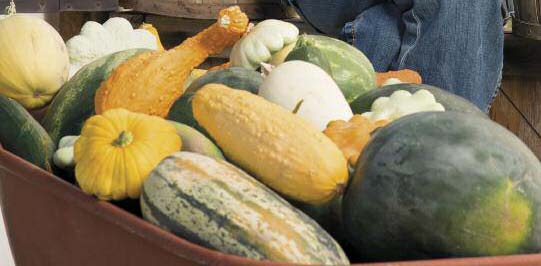cover
CULINARY CARING
In ways big and small, Reno-Tahoe locals connect those in need with vital sources of nutrition.
WRITTEN BY BARBARA TWITCHELL
PHOTOS BY JEFF ROSS AND CANDICE NYANDO
Whether it’s a basket of freshly baked muffins to welcome a new neighbor, a sumptuous meal to celebrate a family occasion, or a bowl of warm soup for a sick friend, food always has been a way to say, “I care.”
It’s a common bond that transcends ethnicity, culture, and geography. Be it joy, compassion, love, sympathy, friendship, or concern — food is a universal language to help us express our feelings and humanity.
Often these gestures of culinary caring come from family members or friends. Sometimes they come through the kindness of strangers. Or they may arrive through official channels such as charitable or governmental programs. Occasionally, they come from unexpected sources.
We are fortunate to live in a place where generosity and volunteerism are deeply embedded in the fabric of our community. Every-day examples abound. The stories offered here are about just a few kind-hearted locals — people who have devised creative and compassionate ways to improve the lives of their neighbors in need. In each case, the medium is food, and the ultimate message is: Someone cares.
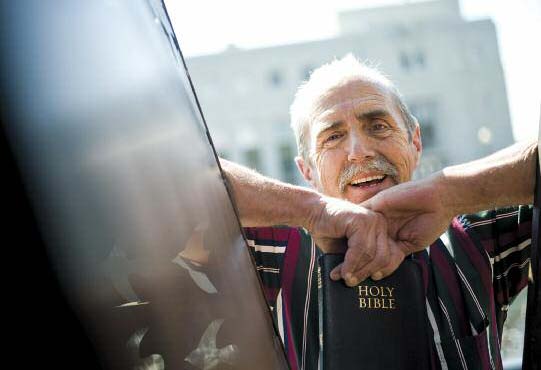
Who’s coming to dinner?
Better not ask Bill Fisher that question around the holidays. You just may end up helping him set the table for … oh, a few thousand guests.
In fact, during the past 15 years, Fisher, with the help of more than a dozen local businesses and scores of volunteers, has served Thanksgiving dinner to almost 30,000 people. His guests? They are Reno’s homeless or struggling, down-on-their-luck folks who would otherwise have no holiday meal at all.
The former Center Street Mission in Reno had offered an annual Thanksgiving meal until its sudden closure in 2002 put the event in jeopardy. That’s when Fisher stepped in — or, more accurately, jumped in with heart and soul. It was, he says, a divine inspiration.
Armed with more determination than know-how, he approached the former food sponsors, officials at Harrah’s Reno and Silver Legacy Resort Casino in Reno, asking them to continue their commitments. They agreed. He then successfully recruited other business owners to provide for every need, from tent to electricity to bathroom facilities.
“First few years were a logistical nightmare,” Fisher admits, “but now we’ve been doing it so long, it’s just awesome.”
And you could spell that with a capital A. Over the years, the event evolved from being a modest meal for 300 to 400 served in a little tent on a dirt lot, into a two-day event serving close to 3,000 people each Thanksgiving. And this is one spectacular meal — turkey, ham, all the trimmings, side dishes, and pies galore — served in a gigantic heated tent, bedecked with white tablecloths, flowers, and even ice sculptures.
What makes this even more remarkable, however, is that the man who spearheaded it all is a convicted felon.
Fisher doesn’t mince words. He’ll tell you right up front that he used to be “a crackhead, a drug dealer, and a thief.” He even went to prison for three years. It was there that he experienced a religious epiphany that changed the course of his life.
Now retired and working part time, Fisher spends most of his free hours trying to help other addicts turn their lives around. But for more than two months each year, his life is dedicated to organizing the holiday meals that bring joy to so many struggling souls.
He works pretty much around the clock for two days on the Thanksgiving event, he says. Once that’s done, he starts gearing up for the Christmas meal that he’s organized for the needy in Winnemucca since 2007, with food provided by the Winnemucca Inn.
And on the first of January?
“I sleep! A lot!” Fisher says with a deep, throaty laugh.
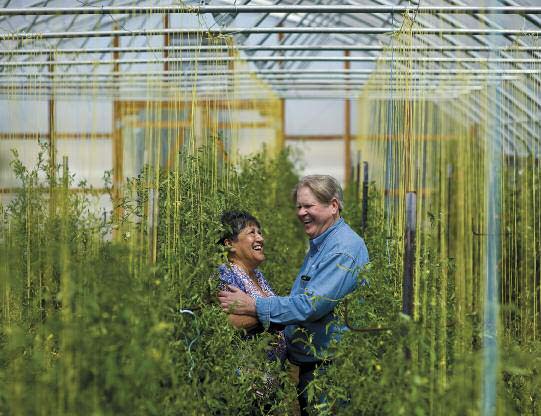
Grow a row
Bill Barth definitely has the Midas touch. Everything he does seems to turn to gold.
Barth and his wife of 45 years, Raquel, better known as Rocky, came from the Silicon Valley business environment, where they did quite well, to put it mildly. They have owned and run many highly profitable businesses. They’ve worked hard for their success.
So in their golden years, what do they do? They buy 10 acres in Minden, a place Barth spent part of his youth, and start Bella Vista Farm. This is not a gentleman’s farm, mind you. No, that’s Bill Barth out there picking blackberries and corn, running their on-site farmers’ market, and busy from dawn to dusk, along with Rocky and just two workers. And he’s loving every minute of it.
What he also loves is sharing the wealth.
For the past two years, the Barths have dedicated a section of their farm to growing produce specifically earmarked for the Carson Valley Community Food Closet, a local food bank that provides nourishment to an average of 1,000 low-income people each month.
Sarah Sanchez, managing director of the food closet, praises the Barths’ generosity, adding that Bella Vista is the only farm that has committed to growing produce specifically for them. Last year it was tomatoes. This past summer it was corn. Lots of it. And Barth always throws in a variety of other produce as well.
“It’s really hard to eat well on a food bank diet without the benefit of fresh produce,” Sanchez says. “And I can tell you, he gives us great stuff that our clients really appreciate!”
Sanchez says that last year, the food closet started a program called Plant, Grow, Give in the hopes of encouraging backyard gardeners to donate their overabundances of produce to the food closet. When the Barths came forward with their generous offer, it inspired Sanchez and her staff to expand their outreach to local farmers.
“We’re so lucky that Bill and Rocky recognize their ability to make a difference and were willing to step up and help us fill the void in the quality and quantity of fresh produce we provide,” Sanchez says. “They’re setting an amazing example for other farms.”
Bill just nods his head and smiles. He’s hoping his old Midas touch is still working because starting a grow-a-row movement among his fellow farmers is exactly what he has in mind.
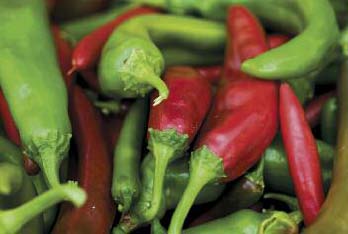
Little nursery that could
If you were curious to know what ever happened to Wonder Woman, she’s alive and well and building hoop houses in Lyon County, Nev.
That’s when she’s not managing eight school gardens plus one community garden, orchestrating three farmers’ markets, teaching people about the benefits of healthy eating and how to raise their own food, providing internships and employment training opportunities, and coordinating community partnerships with schools, farmers, nonprofits, and government agencies.
All the while, she’s also managing a sizeable garden center, which really is where this amazing story begins.
Wendy Madson was hired in 2006 to open Community Roots, a nonprofit nursery for Healthy Communities Coalition of Lyon and Storey counties. The nursery was the brainchild of HCC’s visionary director, Christy McGill.
Madson, a former waitress whose only experience was backyard gardening, agreed to take the job as a temporary position. McGill, however, foresaw great potential in both the nursery and Madson. She was right on all counts.
Ten years later, Madson still is there and Community Roots is 100 percent self-sustaining, serves as a sheltered workshop and youth training venue, and generates financial resources to subsidize numerous other HCC programs. Running/overseeing many of these programs now is part of Madson’s job duties.
Chief among these, and closest to Madson’s heart, are the eight school gardens in Dayton, Silver Springs, Fernley, and Yerington, and the community garden in Silver Springs, all of which have the aforementioned hoop houses (low-tech greenhouses).
The children are part of every piece of building and maintaining those hoop houses and gardens, Madson says. The same is true for the community garden, which is built and maintained by food pantry client-volunteers.
Involvement in the gardens helps develop skills, knowledge, and work ethic, Madson says. Additionally, everyone experiences the satisfaction of sharing the fruits of their labors for the health and enjoyment of their neighbors.
Produce from the school gardens now is served in the Dayton and Silver Springs schools, which thrills the students. The youths also sell it at the HCC farmers’ markets, with proceeds helping to sustain the school garden programs. Similarly, produce from the Silver Springs community garden is sold, at a modest cost, at the daily farmers’ market located at the adjacent food pantry.
Much of Lyon County is a food desert, where fresh, healthy produce isn’t always readily available, and even in places where it is, it’s not always affordable for people with limited incomes, Madson says. The gardens and farmers’ markets, all largely subsidized by the Community Roots Nursery, have made a huge difference to the residents of those areas.
Madson admits she never imagined her little nursery job would evolve into such a crazy quilt of diversified responsibilities, but she has no regrets.
“Seeing how people are transformed because somebody believes in them and then seeing how they give back to the next person is so gratifying,” Madson says. “These people have completely changed my life.”
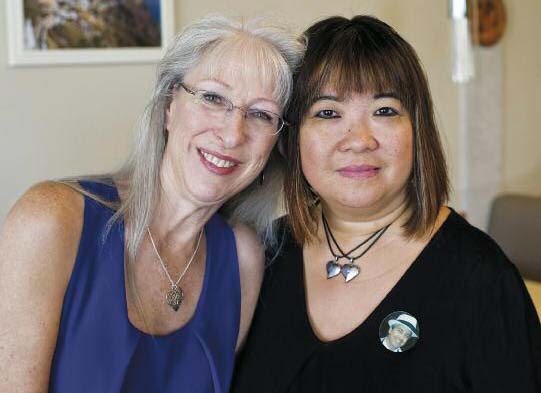
A mob scene
When Elizabeth Rose learned local restaurateur Nikos Theologitis lost his battle with cancer on Jan. 7, 2016, it did more than touch her heart. It awakened a deeply felt and personal memory.
Five years earlier, Rose had lost her husband to cancer. Remembering how overwhelming and difficult it was to face the days that followed, Rose decided to do something to honor Theologitis’ memory and help his widow, Jacqui, and their children.
“I wanted to do more than just give some money and walk away,” Rose says. “I wanted to do something that would have a greater long-term effect.”
That’s when she hit upon an ingenious idea.
Rose, who handles traffic, weather, and public affairs programming for Shamrock Communications, certainly is no stranger to the power of electronic media. In addition to her radio day job, she’s also an administrator for Reno Foodies, a popular Facebook webpage created by local celebrity chef, Clint Jolly. With more than 7,000 food-loving members, this seemed to Rose to be the perfect venue to launch her idea for creating an Angel Mob to support the Theologitis family.
She posted a simple request on the Reno Foodies page, asking fellow food enthusiasts to eat at either or both of the Theologitis’ Greek Kitchen restaurants on Jan. 30 and 31. She urged folks, if they enjoyed their meals, to tell their friends and keep patronizing the restaurants in the future.
The results were phenomenal. People turned out in droves, showering the grieving family and workers with kindness and compassion, as well as financial relief. The effort also had the long-term effect Rose had hoped for — a loyal legion of new customers.
Since then, the Angel Mob has evolved into an altruistic movement of sorts, helping individual residents of the Reno-Sparks community, according to Rose.
“Say somebody had knee surgery and was having difficulty cooking for their family or getting to the grocery,” Rose says. “We try to help out.”
It’s a group effort, with members of the Reno Foodies community letting her know about these situations through private Facebook messages. And there’s no shortage of caring members willing to give a helping hand, Rose says.
As creator and organizer of the Angel Mob, Rose is thrilled to see her fledgling idea take flight and hopes it continues to grow.
“I really believe that you don’t look for angels in your life,” Rose says. “You try to be one.”
Reno writer Barbara Twitchell says that the best thing about writing is having the opportunity to meet interesting, caring, wonderful people who try to make a real difference in our community. She feels like she hit the jackpot doing this article!
A dream in the making
Every great accomplishment starts with a dream. Reno businessman Shannon Dobbs believes in dreaming big. He wants to open a nonprofit grocery store, named On Common Ground, in the heart of downtown Reno. Why?
“Many people don’t realize that the downtown area is considered a food desert by the USDA,” Dobbs says. “That means the 11,000 low-income residents of downtown have difficulty accessing nutritious food.”
Dobbs and his wife, Michelle Peltier, have been working for the better part of this year to get this worthy project off the ground. For details, visit http://www.Ocgreno.org
